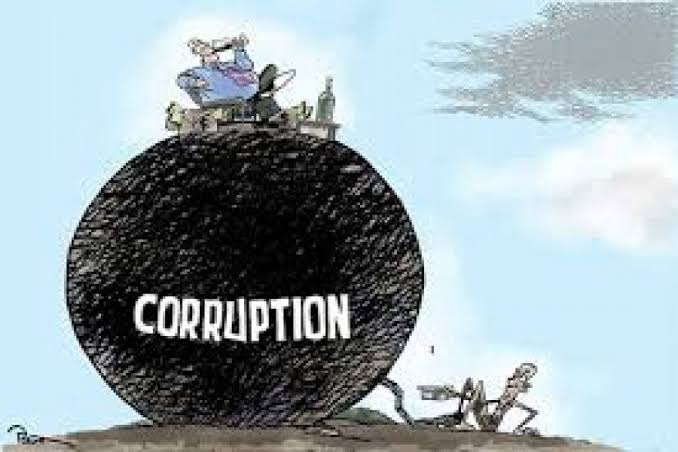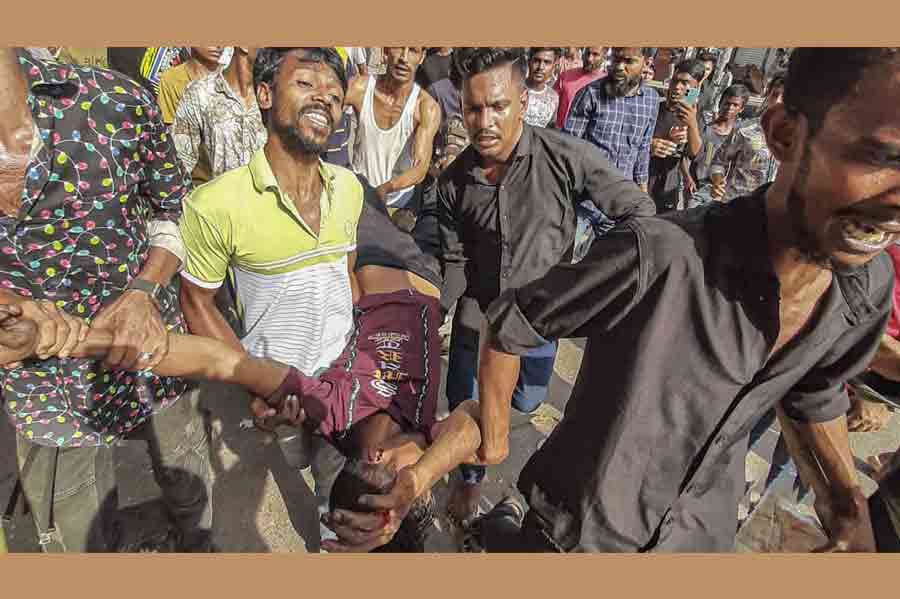Saif
Senior Member
- Joined
- Jan 24, 2024
- Messages
- 17,262
- Likes
- 8,334
- Nation

- Residence

- Axis Group


Extortion and corruption eat into vitals of society
The killing of a scrap metal trader in old Dhaka has jolted the national conscience. Killings of innocent members of public by muggers, dacoits, anti-social elements including teenage gangs have become so common that the entire country is turning into a death valley. But it is the extortionists who
Extortion and corruption eat into vitals of society
Neil Ray
Published :
Jul 13, 2025 23:19
Updated :
Jul 13, 2025 23:19

The killing of a scrap metal trader in old Dhaka has jolted the national conscience. Killings of innocent members of public by muggers, dacoits, anti-social elements including teenage gangs have become so common that the entire country is turning into a death valley. But it is the extortionists who have targeted businesses---from small traders to big merchants ---in order to extract large sums of money. Such killings were there during the previous regimes and there is no let-up, if not shown a rising trend, of extortion-related crimes including killings.
In case of the murder of the scrap metal trader in old Dhaka, the manner of taking the victim's life is what has challenged the collective sense of right and wrong. The brutal treatment of a human being and the disrespect for a deceased body expose the diabolical mind behind such acts. This bizarre spiteful way of deriving pleasure from taking life of one who merely refused to comply with their demand for a monthly rate of Tk200,000 cannot but send shockwaves across all levels of society here. Fittingly, there has been a widespread outcry against the extortion and the appalling crime.
In this context, the statements made by the law adviser and the home adviser are quite intriguing---one says the case will be referred to the Speedy Tribunal Court for early trial and the other claims legal action has been initiated against those involved in the killing. Are these not too little too late? Indeed, the interim government has miserably failed to address the declining law and order situation in the country. Let alone the earlier vandalism and destruction of a number of infrastructure, when organised attacks were unleashed on some sites of historical importance including the museum on Road 27, Dhanmondi, the War of Liberation Museum located in Agargaon and some religious shrines, the government turned a blind eye to such mob violence.
The latest rise in mob culture finds its encouragement from the government's inaction. But there is more to the elements of criminal proliferation. Immediately after the fall of Sheikh Hasina's autocracy, there was a need for restraint on extortion in order to breathe a fresh air into the country's business sector. Indications are clear that both bribery and extortion are still rife in society. What is particularly galling is that a party well poised to take over if an election is held on a level-playing field, has failed to establish its command on leaderships at the grassroots level.
Allegedly, in the case of the latest murder in old Dhaka, accusing fingers have been pointed to this political organisation. Internecine feuds in the party make regular news. Yes, the high command of the Bangladesh Nationalist Party (BNP) has time and again warned its followers down the rank not to get involved in criminal activities. But all such exhortations seem to have fallen on deaf ears. Why? Are the BNP leaders playing to the gallery? It is reported that the party has by this time boosted its organisational activities in order to face the election. No question about such organisational activities. But does such party organisation not encompass the very basics of how party workers would conduct themselves? Did the party get across a stern message that their field-level leaders and followers can no longer follow the discarded political ways and practices of the deposed party that turned into a monster because of the 15-year long reign? It appears there is many a slip between the cup and the lip.
But here was a golden opportunity not only for the BNP but all other parties to mend their political ways in favour of a corruption- and extortion-free country---one that would gradually help reduce discrimination and disparities in society. The poor and marginalised people would have an opportunity to rediscover their rightful place in order to take part in the economic and development activities and share dividends of prosperity accordingly. The anti-trade and anti-entrepreneurship ambience extortion and bribery create should have by now been disposed of.
Neil Ray
Published :
Jul 13, 2025 23:19
Updated :
Jul 13, 2025 23:19
The killing of a scrap metal trader in old Dhaka has jolted the national conscience. Killings of innocent members of public by muggers, dacoits, anti-social elements including teenage gangs have become so common that the entire country is turning into a death valley. But it is the extortionists who have targeted businesses---from small traders to big merchants ---in order to extract large sums of money. Such killings were there during the previous regimes and there is no let-up, if not shown a rising trend, of extortion-related crimes including killings.
In case of the murder of the scrap metal trader in old Dhaka, the manner of taking the victim's life is what has challenged the collective sense of right and wrong. The brutal treatment of a human being and the disrespect for a deceased body expose the diabolical mind behind such acts. This bizarre spiteful way of deriving pleasure from taking life of one who merely refused to comply with their demand for a monthly rate of Tk200,000 cannot but send shockwaves across all levels of society here. Fittingly, there has been a widespread outcry against the extortion and the appalling crime.
In this context, the statements made by the law adviser and the home adviser are quite intriguing---one says the case will be referred to the Speedy Tribunal Court for early trial and the other claims legal action has been initiated against those involved in the killing. Are these not too little too late? Indeed, the interim government has miserably failed to address the declining law and order situation in the country. Let alone the earlier vandalism and destruction of a number of infrastructure, when organised attacks were unleashed on some sites of historical importance including the museum on Road 27, Dhanmondi, the War of Liberation Museum located in Agargaon and some religious shrines, the government turned a blind eye to such mob violence.
The latest rise in mob culture finds its encouragement from the government's inaction. But there is more to the elements of criminal proliferation. Immediately after the fall of Sheikh Hasina's autocracy, there was a need for restraint on extortion in order to breathe a fresh air into the country's business sector. Indications are clear that both bribery and extortion are still rife in society. What is particularly galling is that a party well poised to take over if an election is held on a level-playing field, has failed to establish its command on leaderships at the grassroots level.
Allegedly, in the case of the latest murder in old Dhaka, accusing fingers have been pointed to this political organisation. Internecine feuds in the party make regular news. Yes, the high command of the Bangladesh Nationalist Party (BNP) has time and again warned its followers down the rank not to get involved in criminal activities. But all such exhortations seem to have fallen on deaf ears. Why? Are the BNP leaders playing to the gallery? It is reported that the party has by this time boosted its organisational activities in order to face the election. No question about such organisational activities. But does such party organisation not encompass the very basics of how party workers would conduct themselves? Did the party get across a stern message that their field-level leaders and followers can no longer follow the discarded political ways and practices of the deposed party that turned into a monster because of the 15-year long reign? It appears there is many a slip between the cup and the lip.
But here was a golden opportunity not only for the BNP but all other parties to mend their political ways in favour of a corruption- and extortion-free country---one that would gradually help reduce discrimination and disparities in society. The poor and marginalised people would have an opportunity to rediscover their rightful place in order to take part in the economic and development activities and share dividends of prosperity accordingly. The anti-trade and anti-entrepreneurship ambience extortion and bribery create should have by now been disposed of.









































